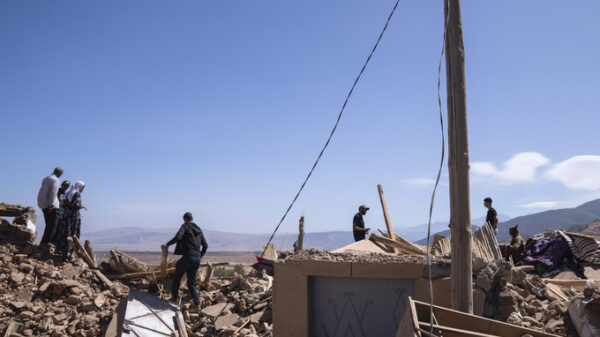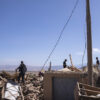FILE – In this image provided by the U.S. Navy, the guided-missile destroyer USS Laboon (DDG 58) fires a Tomahawk land attack missile on April 14, 2018, as part of the military response to Syria’s use of chemical weapons on April 7. Australia said it’s planning to buy up to 220 Tomahawk cruise missiles from the United States after the U.S. State Dept. approved the sale Friday, March 17, 2023. (Kallysta Castillo/U.S. Navy via AP, File)
CANBERRA, Australia (AP) — Australia said it’s planning to buy up to 220 Tomahawk cruise missiles from the United States after the U.S. State Department approved the sale Friday.
The deal comes days after Australia announced it would buy nuclear-powered attack submarines from the U.S. to modernize its fleet amid growing concern about China’s influence in the Indo-Pacific.
Australian officials said the new nuclear-powered submarines would be able to fire the Tomahawk missiles.
Japan last month also announced plans to upgrade its military in an effort to deter China, including buying 400 Tomahawk cruise missiles for deployment as soon as 2026.
The Australian missile sale comes with a price tag of nearly $900 million. The prime contractor will be Arizona-based Raytheon Missiles and Defense.
“This proposed sale will support the foreign policy and national security objectives of the United States,” the State Department said in a statement. “Australia is one of our most important allies in the Western Pacific.”
Australian Defense Minister Richard Marles said his country would be working closely with the U.S.
“Making sure we have longer-range strike missiles is a really important capability for the country,” Marles told Channel Nine. “It enables us to be able to reach out beyond our shores further, and that’s ultimately how we are able to keep Australia safe.”
Defense Industry Minister Pat Conroy said the missiles could be fired from the Virginia-class submarines Australia would be buying under the so-called AUKUS deal.
“We certainly want the best possible capability for the Australian Defense Force, so that includes the ability to strike opponents as far away as possible from the Australian mainland,” he told the Australian Broadcasting Corp. “The cruise missiles are a critical part of that, as are the submarines that launch them.”
The submarine deal has raised concerns that it could clear the way for bad actors to escape nuclear oversight in the future. Rafael Grossi, director-general of the International Atomic Energy Agency, this week pledged to be “very demanding” in overseeing the planned transfer from the U.S. to Australia.
Former Australian Prime Minister Paul Keating this week launched a blistering attack on his nation’s plans, saying that because of the huge cost, “it must be the worst deal in all history.”
Australian officials have estimated the cost of the submarines at between 268 billion and 368 billion Australian dollars ($178-$245 billion) over three decades.
Prime Minister Anthony Albanese said the government had been transparent about the expense.
“The assessment that has to be made is does the purchase, and then us building our own nuclear-powered submarines, increase the capacity for us to defend ourselves by more than 10%? You bet it does,” Albanese told the Australian Broadcasting Corp. “That’s why it represents good value.”
Copyright 2021 Associated Press. All rights reserved.






























You must be logged in to post a comment Login